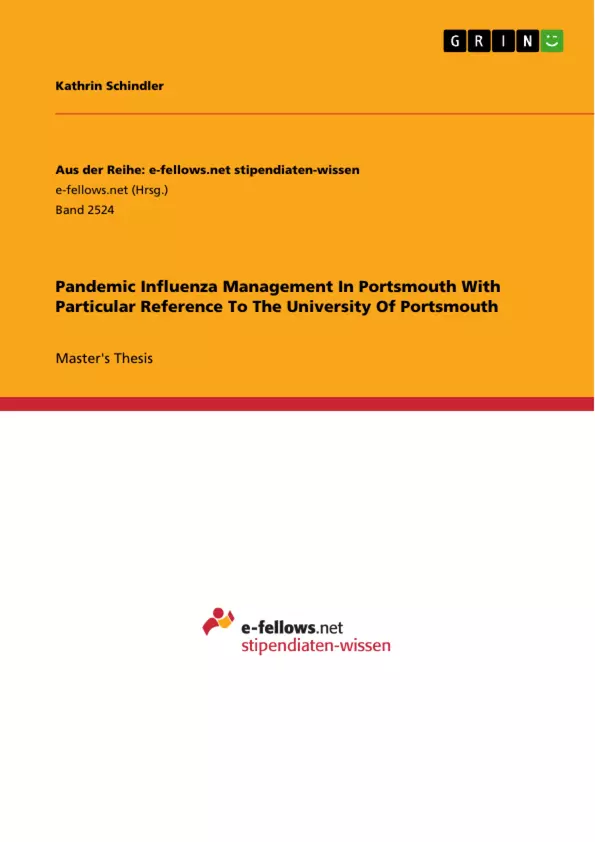Influenza pandemics represent natural phenomena that occur at irregular intervals throughout the centuries. According to the World Health Organization (WHO), a pandemic is triggered when an influenza virus which was not previously circulating among humans and to which most people don't have immunity emerges and transmits among humans. In essence, a pandemic influenza could lead to numerous contemporaneous epidemics all over the world with high amounts of cases and deaths. Due to increasing global transport and urbanisation, pandemics triggered by a new influenza virus would spread rapidly around the world (WHO, 2005). Therefore, it is important that authorities are prepared to recognise and manage pandemic influenza and, in this way, minimise its destructive potential on economy and society. Thus, it might be within the bounds of possibility to limit the spread of the pandemic influenza virus strain, which would lead to a reduction of the number of hospitalisations and fatalities.
This dissertation aims at analysing the status quo of pandemic influenza preparedness in Portsmouth and the University of Portsmouth, respectively. Beyond that, it intends to gain an impression of the level of awareness towards pandemic influenza among students of the University of Portsmouth. The dissertation focuses on the following aspects:
(1) What characterises a pandemic influenza?
(2) What has already been done in terms of planning for a pandemic influenza in Portsmouth?
(3) What has already been done in terms of planning for a pandemic influenza at the University of Portsmouth?
(4) In what way are students aware of the pandemic influenza threat?
Table of Contents
- INTRODUCTION
- Context
- Aim
- Research questions
- LITERATURE REVIEW
- Characteristics of a pandemic influenza
- Analysis of the Portsmouth City Council Pandemic Response Plan
- Response
- Initial phase response
- Low impact response
- Moderate impact response
- High impact response
- Post-pandemic recovery phase
- Communication
- Spokespeople
- Key messages and communication tools
- Adult care
- Residential care homes
- Social care and care management
- Education
- Management of excess deaths
- Response
- Analysis of the University of Portsmouth Pandemic Contingency Plan
- Response
- Response during WHO phases 1 and 2
- Response during WHO phase 3
- Response during WHO phase 4
- Response during WHO phase 5
- Response during WHO phase 6
- Post-pandemic recovery phase
- Communication
- Education
- Response
- METHODOLOGY
- Study design
- Study subjects
- Sampling technique and data analysis
- RESULTS
- Socio-demographic characteristics
- General knowledge about pandemic influenza
- Risk perception
- Behaviour during a pandemic influenza
- Perceptions and concerns relating to the vaccine
- DISCUSSION
- Portsmouth City Council Pandemic Response Plan
- University of Portsmouth Pandemic Contingency Plan
Objectives and Key Themes
This dissertation aims to analyze the preparedness of Portsmouth and the University of Portsmouth for a pandemic influenza outbreak. It also aims to understand the level of awareness among students of the University of Portsmouth regarding pandemic influenza.
- Pandemic influenza preparedness in Portsmouth and the University of Portsmouth
- Analysis of the Portsmouth City Council Pandemic Response Plan and the University of Portsmouth Pandemic Contingency Plan
- Awareness of pandemic influenza among students of the University of Portsmouth
- Assessment of student knowledge about transmission and prevention of pandemic influenza
- Student attitudes towards pandemic influenza and vaccination
Chapter Summaries
- The introduction provides the context for the research and outlines the dissertation's aim and research questions.
- The literature review section examines the characteristics of pandemic influenza and analyzes the Portsmouth City Council Pandemic Response Plan and the University of Portsmouth Pandemic Contingency Plan. It covers aspects like response stages, communication strategies, adult care, education, and management of excess deaths.
- The methodology chapter details the study design, subjects, sampling technique, and data analysis approach used in the research.
- The results chapter presents the findings of the online survey conducted among students of the University of Portsmouth. It covers socio-demographic characteristics, general knowledge about pandemic influenza, risk perception, behavioral intentions during a pandemic, and perceptions towards vaccination.
- The discussion section explores the implications of the findings, analyzing the strengths and weaknesses of the Portsmouth City Council and University of Portsmouth plans in relation to the students' awareness and preparedness for a pandemic influenza outbreak.
Keywords
The primary keywords and focus topics of this dissertation include pandemic influenza, preparedness, Portsmouth, University of Portsmouth, students, awareness, risk perception, communication, vaccination, and contingency plans. It also explores the relationship between these concepts and the effectiveness of the implemented response strategies.
Frequently Asked Questions
What triggers an influenza pandemic according to the WHO?
A pandemic is triggered when a new influenza virus emerges to which most people have no immunity, and it begins to transmit rapidly among humans worldwide.
How prepared is the University of Portsmouth for a pandemic?
The university has a Pandemic Contingency Plan that outlines specific responses aligned with WHO phases, focusing on communication, education, and operational continuity.
Are students aware of the risks of pandemic influenza?
The dissertation analyzes student awareness, showing varying levels of knowledge regarding transmission, risk perception, and behavioral intentions during an outbreak.
What are the key elements of the Portsmouth City Council's response plan?
The plan includes response stages (initial to high impact), communication strategies, adult care management, and protocols for managing excess deaths.
Why does urbanization increase pandemic risks?
High population density in urban areas, combined with global transport links, allows new viruses to spread much more rapidly than in the past.
- Citation du texte
- Kathrin Schindler (Auteur), 2016, Pandemic Influenza Management In Portsmouth With Particular Reference To The University Of Portsmouth, Munich, GRIN Verlag, https://www.grin.com/document/369410



